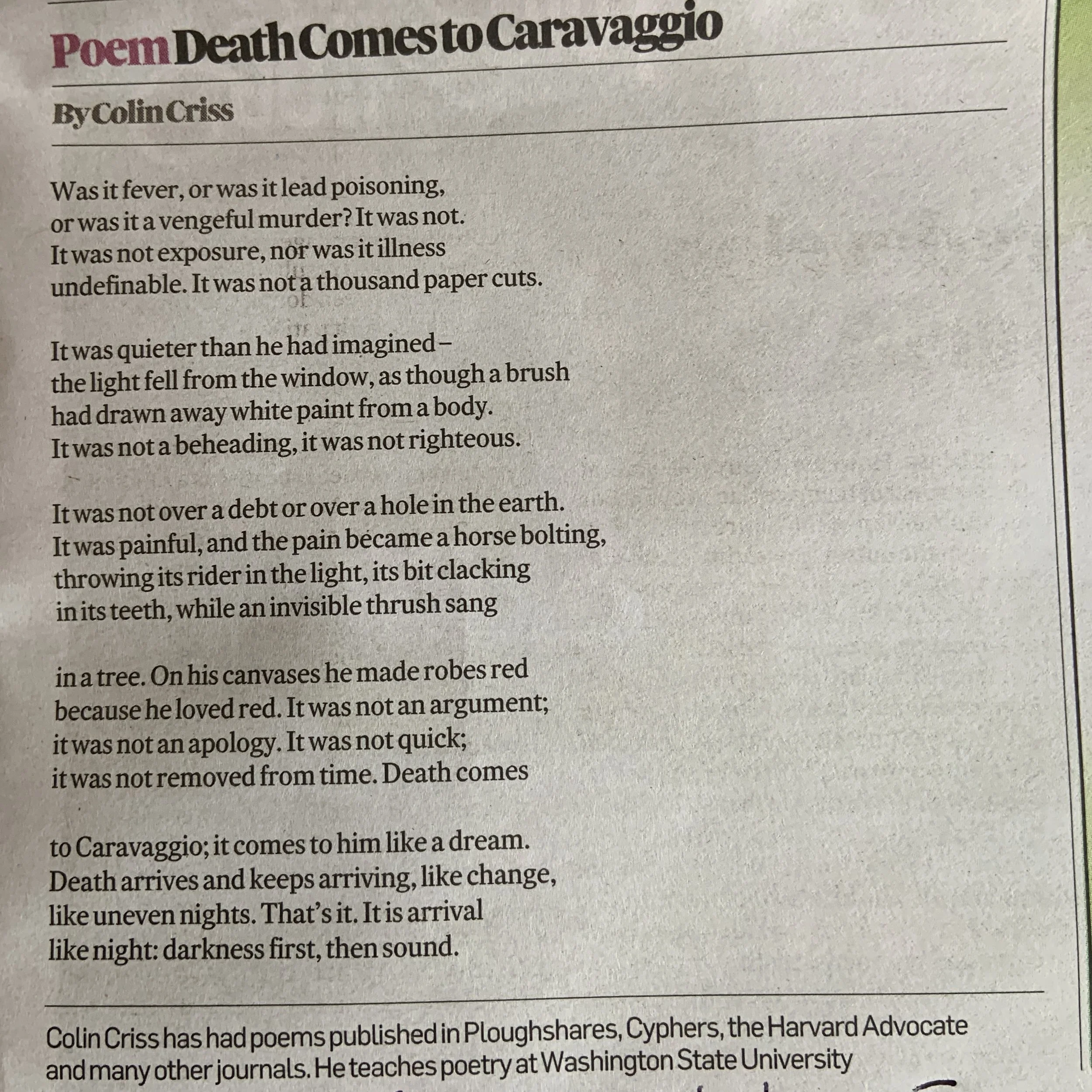Colin Criss, Palouse Pathways Board Member, Featured in The Irish Times
Palouse Pathways is proud to share that our board member, Colin Criss, recently had his poem published as the Poem of the Week in The Irish Times. It explores the mysterious death of Italian painter Caravaggio.
Colin is an Assistant Professor of English at the Washington State University Honors College and the Faculty Editor of The Palouse Review, the college’s literary arts journal. He studied Sociology at Harvard University and went on to earn his MFA from Washington University in St. Louis.
Students in the Palouse Pathways Scholars Program know him as a dedicated mentor, supporting students through college application essay workshops and individualized advising. Retal Abdellatiffe, a senior at Pullman High School, said, “If you’ve ever been in one of Colin’s workshops, you know what I mean when I say he brings this energy that makes everyone feel capable of creating something meaningful. There’s something about the way Colin talks about writing that makes you actually want to write. Other than being really funny, Colin is one of the most enthusiastic and genuinely wholesome people I’ve ever met; and I really think that’s what makes him such a great writer who truly enjoys helping students.”
We spoke with Colin about his journey into poetry and his experiences as a writer, teacher, and mentor.
When did you first become interested in poetry, and how?
I first became interested in poetry in a general education course in college. I’d never put much thought into poems before that. There was a course, though, that met about thirty yards from my freshman dorm room that satisfied a graduation requirement… so I took it, and immediately fell head first into reading, thinking about, and (eventually) writing poetry.
What did you enjoy most about studying sociology in college, and did you find ways to connect it with your interest in poetry?
I love sociology. It is the study of society–anywhere there’s more than one person, there is sociological truth to be found, analyzed, and even used to shape our world to be better. It felt like the most immediately relevant and flexible course of study for me–as things have changed since I graduated college, my training in thinking sociologically has allowed me to contextualize and re-contextualize the world. I try to continually challenge my understanding of the world, and think about how the structure of the world can be adjusted for the benefit of humanity.
Poetry lets me challenge myself in a similar way–it challenges my understanding of the use and shape of language. Poetry is patterned language–the way those patterns occur and shift and end tells us a lot about ourselves and those around us. I’m not thinking historically here–I’m thinking about approaching a poem, which is an art object that is successful, perhaps, when it surprises me and changes my thinking.
What is something people misunderstand about being a poet?
I think a lot of people assume that poetry is outdated, because they generally stop thinking about poetry after reading only older poems. It’s not! So many people are writing and publishing all kinds of poems these days… I really believe that there’s a book of poems out there that will interest and excite everyone.
I think a lot of people think that there’s a huge barrier to entry to be a poet–you need some kind of recognition or training or talent thrust upon you at birth. You don’t! Really you only need a pen and a piece of paper. A library card helps too.
I think a lot of people think writing poetry is only about “expressing yourself”--it can be, but I don’t think poetry should be disregarded as merely personal… poetry is about re-making language, which we do for many purposes. We use poetry to “outstrip the given,” as Seamus Heaney would say.
What is your advice for students who are curious about poetry but aren’t sure where to begin?
My big advice is to try to link up with somebody who already loves poetry. Poetry readers are the best evangelists for poetry reading. Ask a librarian where to start, too. Maybe even take a poetry class that satisfies a general education requirement… Read these books: Catalogue of Unabashed Gratitude, by Ross Gay; The Wild Iris, by Louise Glück; Crush, by Richard Siken; Death of a Naturalist, by Seamus Heaney; any of Charles Simic’s books… I’ll note, these are all critically-acclaimed books, but they’re also books, I think, that are accessible to the poetry-curious because they are thoroughly surprising. Finally–close your door and read poems out loud, and slowly.

